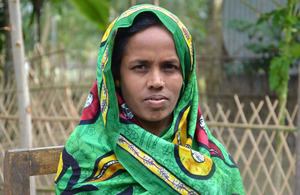Growing their way to health and security in Bangladesh
How UK aid has helped improve food security in the river islands of North Western Bangladesh.

No longer hungry: Honufa is proud of her achievements. Picture: Chars Livelihood Programme
ŌĆ£We are now eating without thinking. If we wished, we could eat 4 meals a dayŌĆØ, Honufa explains as she is preparing food for her daughter.
Food was not always abundant in HonufaŌĆÖs home. There were times when her family only ate once or twice a day. She often skipped meals for days at a time when her husband could not find work.
Honufa lives on a char in the district of Kurigram, Bangladesh. Chars are river islands that are among the most impoverished and isolated areas of the country. Over the last 3 years, thanks to a UK funded programme, Honufa and her family now have access to sufficient quantities of nutritious food on a consistent basis.
Honufa and her husband were extremely poor. Like many men in the chars, her husband relies on selling daily physical labour, an unreliable source of income. They did not own many assets ŌĆō only a few chickens and a shared goat ŌĆō and were not able to cultivate crops. Even rice was not always affordable. There were times when she relied on rice handed out through local government support.
Buying, selling and reinvesting assets
In February 2009, Honufa joined the , jointly funded by UK aid through the Department for International Development and the Australian government and sponsored by the government of Bangladesh.
This changed her life.
Honufa bought a cow using the Chars Livelihood Programme asset transfer grant. Through such grants the programme is helping households to develop sustainable livelihoods with the aim of lifting them out of extreme poverty. Honufa managed to sell her cow for profit (about ┬Ż150) and then used that money to lease land, buy a small cow and plant 200 trees.
ŌĆ£I now grow jackfruit, lychee, pumpkin and my favourite, mangoŌĆØ, she says. Last year, she made some extra money by selling 40kg of her home grown apples.
Honufa recently used all of her savings and sold her cow to purchase the land that she previously leased. She uses this land to grow her own rice. Now, HonufaŌĆÖs family no longer requires government assistance and doesnŌĆÖt even need to buy rice from the market; they produce more than they can eat.
Less vulnerable
With the programmeŌĆÖs support, Honufa has accumulated a number of assets, including cows, ducks, sheep and chickens. This has allowed her to diversify her sources of food and made her less vulnerable to hunger and poverty.
As part of its support, the programme also taught Honufa how to cultivate a homestead garden. She now cultivates a variety of vegetables, including green and red spinach.
Honufa sells the vegetables she grows and invests that money into her daughterŌĆÖs education. Her family no longer struggles as food is always readily available. ŌĆ£Now, we feel less vulnerable. My family is comfortable and I am always thinking towards our futureŌĆØ.
Nutrition for growth
The UK government and the ChildrenŌĆÖs Investment Fund Foundation (CIFF) will be co-hosting a high-level international meeting, Nutrition for Growth: Beating Hunger through Business and Science on 8 June 2013 in London.